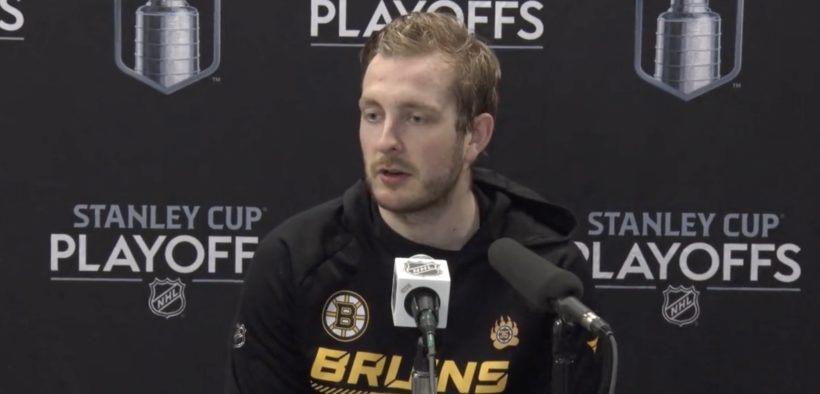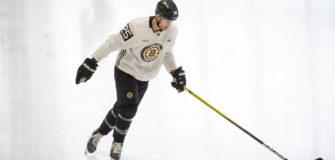What we learned: opportunistic ‘Canes capitalize on Bruins’ miscues
Share

RALEIGH, N.C. — When it rains, it pours.
The Boston Bruins had a golden opportunity ahead of their Game 1 matchup with the Carolina Hurricanes. Backup goalie Antti Raanta was in net for the injured Frederik Andersen, who continues to nurse a lower-body injury.
Bruce Cassidy’s generated good looks. Raanta allowed a handful of rebounds early on. But the veteran eventually settled in, making multiple quality saves in his first career postseason start.
Eventually, the missed chances came back to haunt the Bruins as an ugly trend carried over into Monday’s series opener. A pair of late second-period goals from a Seth Jarvis tip and a Nino Neiderietter snipe sent the PNC Arena crowd into a frenzy.
It wasn’t that they didn’t establish good habits. They did, especially in the attacking end. They also witnessed Charlie McAvoy spearhead Boston’s physicality in a bruising Game 1 matchup. And they put themselves back within striking distance on Taylor Hall’s marker early in the third.
But the B’s deviated from their system at the worst times against the opportunistic Hurricanes. They once again faced a two-goal deficit after Teuvo Teravainen converted on an odd-man rush at 7:02 of the final stanza, 4:09 after Hall’s marker. With the continued power-play struggles and matchup concerns with the third line, the Bruins just couldn’t overcome their deficits to begin the series.
A Vincent Trocheck tally from the goal line and a Svechnikov empty netter secured Boston’s series-opening fate. Here’s what we learned from Carolina’s 5-1 triumph.
Bruins commit a double-whammy of second-period breakdowns
The Bruins had their legs going from the get-go. What they didn’t have was a killer instinct.
For nearly two periods, the Bruins countered Carolina’s counterattack with timely stick checks, aggressive hitting and stout defensive layers. On the other end, they sustained a healthy attacking zone setup, establishing a handful of secondary scoring opportunities.
But then the Bruins entered chase mode. They entered the third period in a 2-0 hole after Jarvis and Neidereitter notched their first goals of the playoffs a mere 2:10 apart at 16:28 and 18:38 of the middle stanza.
“Our game is not going to change much home or road to be honest with you. So we were going to approach it the same way,” Cassidy said of the second-period setback. “You could see them coming a little bit. Some of it was us recognizing that, okay ‘let’s manage the puck and get through it and get the game back going our way.’ We made a few mistakes. They played to their strengths, got the puck to the net and were willing to hang around the front of the net.”
Some of the trendy goals they’ve allowed in the final minute of a period came from sure puck luck. Others came via structural issues, costly penalties or unforced turnovers.
The Bruins need more urgency during the final minute of play. They need to clean up those issues quickly. Otherwise, they’ll be hitting the golf course early.
The power-play faltered again
David Pastrnak’s return from injury in the final week of the regular season provided a shot in the arm for Boston’s struggling power play. They didn’t receive immediate results, yet, slowly but surely, got their timing back with opposing penalty kills needing to account for Pastrnak’s patented one-timer from the faceoff dot.
The setup opened up opportunities for Patrice Bergeron from the bumper and Hall in front of the net. It allowed Brad Marchand to set their cycle up at the half wall and for McAvoy to distribute feeds from the point. Eventually, they found the back of the net in their second to last game of the season against the Sabres — twice.
Well, whatever momentum Boston’s power play generated over the last week didn’t carry over into the start of the postseason.
Carolina’s league-leading penalty kill stymied the Bruins from gaining clean entries. They established a solid tempo on their first opportunity but struggled to generate looks on their second and third attempts, with a grand total of zero shots on their final chance of the night.
“We didn’t hold on to pucks the way we wanted to,” Hall said of the power play struggles against a stout Hurricanes shorthanded unit. “They’re really stiff at the blue line. They stand up and make you put it in spots and then they pressure to where they think you’re going to move the puck to next.”
Of course, the lack of power-play success in 2011 didn’t prevent them from hoisting the Cup. And they won’t have an easy time establishing momentum against Carolina’s stout shorthanded unit.
But the power play can’t afford to stagnate much further. Otherwise, it will turn into a momentum-killer.
Will Ullmark get the short leash?
Ullmark and Raanta encountered some difficulties with the playoff jitters in their first playoff starts. Both struggled to track pucks, allowing for juicy rebounds in front of the crease.
Raanta settled in as the game progressed. But Ullmark also made some timely saves, including his second-period stop on a Teravainen chance from the slot.
Yet, the playoffs don’t provide much room for breathing. More often than not, teams have to rely on scoring greasy goals on screens and tips and less on lighting the lamp through odd-man rushes. Teravainen’s third-period goal on a 2-on-1 is more of a novelty than a regular occurrence.
It also means goalies have to fight through a sea of humanity to stop pucks. Raanta eventually settled into a groove during a busy night. Ullmark, while struggling at times squaring up to shots, didn’t receive the same help from the D in front of him once the Hurricanes found their offensive rhythm.
“We’re not going to put anything on Ullmark. Whatever goalie is in there for us, you have to fight to find pucks in the series,” Cassidy said of Ullmark’s 20-save performance.
“I thought it was the same in the other end early on. Raanta was fighting to find them. There were some rebounds there; we just didn’t capitalize. It could’ve went the other way if some of [our shots] had eyes early on. But give them credit. That’s how the play. We have to do a better job in lanes, and Linus will have to fight harder as well. That’s just the hand that’s going to be dealt.”
Cassidy wouldn’t pinpoint the loss on Ullmark. But he wouldn’t confirm his Game 2 starter following Monday’s loss.
No matter what, Ullmark or Jeremy Swayman will need to find a way to track the puck against a heavy Carolina bunch. They may fall victim to some puck luck, but they could also find themselves on the receiving end of those odd bounces.=
“It’s just going to come down to some bounces here and there,” Ullmark said. “And that’s just hockey.”









